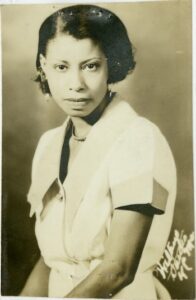
Corinthian Nutter
*Corinthian Nutter was born on this date in 1906. She was a Black teacher, musician, and education activist.
Corinthian Clay Ricks (her birth name) was born in Forney, Texas, to Robert R. and Roxie Anna (Ford) Ricks. Her father worked for the railroad. Her mother was an itinerant worker, and Nutter was frequently taken out of school to work. She fell behind in class and dropped out at age 14. In 1922, after a brief marriage, Nutter moved to Kansas City, Missouri, and lived at the YMCA. She played the piano for numerous entertainers and the organ for silent movies. She found lodging with a member of Bennie Moten's jazz band. Nutter became a friend of Moten and his pianist, William "Count" Basie.
She earned her high school diploma in 1936. She commuted to Western University in Quindaro, Kansas, to complete her bachelor's degree. In 1938, Nuutter received a Kansas teaching certificate. She began commuting to Emporia State University, pursuing her master's degree in education. She married Austin K. Nutter in Kansas City, Missouri, on June 2, 1941. He died in 1998. In 1943, she was the only certified teacher at a two-room school in Merriam. The school's name was Walker Elementary. The conditions there weren't just unequal to those of the local schools for white children; they were repulsive. Over three dozen Black children crammed into one classroom and later two, where teachers taught eight different grades. The school had no cafeteria, auditorium, reliable heating, up-to-date textbooks, or indoor plumbing. Children went to the restroom in an outhouse next to a bunch of scrap metal. That was the playground.
1947, School District 90 opened South Park Elementary, a new school right by Walker Elementary. The school had what Walker did not, including multiple teachers and separate classrooms. It was built with public proceeds of a $90,000 bond election. However, the new South Park only allowed white students to attend. Black parents were outraged, as their tax dollars had helped pay for South Park Elementary, but their children weren't able to attend. The school district trustees justified the segregation by arguing that the school's enrollment was based on the attendance areas drawn up for each school.
In what became known as the Walker School walkout, the Black parents removed 39 of their 41 children from Walker Elementary. Instead of continuing to teach at Walker, Nutter "left her job there and helped teach the students for a year in two private homes. Parents paid her when they could before the NAACP started compensating Nutter and another teacher, Hazel McCray-Weddington, $50 a month. A white Russian-Jewish woman who lived right by the new South Park, Esther Brown, was incensed by how the Black students were treated in comparison to white students. She recommended that Walker Elementary's parents file a lawsuit.
The watershed desegregation case of Webb vs. School District 90 went all the way to the Kansas Supreme Court, with Nutter serving as a key witness. "The school was dilapidated, we had no modern conveniences, and we had to go outside to the toilet. And if they were going to build a new school and the parents were paying taxes like everybody else, why couldn't their children go? Schools shouldn't be for a color. They should be for children," Nutter told The Star in a profile on February 3, 2002. Corinthian Nutter died February 10, 2004, at her home in Shawnee at age 97.
To Become an Elementary School Teacher
To Become a Middle School Teacher